Christianity and Buddhism Viewpoints on Euthanasia: A Critical Consideration of George's Case
VerifiedAdded on 2023/06/10
|7
|2030
|450
AI Summary
This assignment critically evaluates the ethics and viewpoints from Christianity and Buddhism in George's case. It provides a personal reflection from the perspective of the author belief and interpretation of euthanasia.
Contribute Materials
Your contribution can guide someone’s learning journey. Share your
documents today.
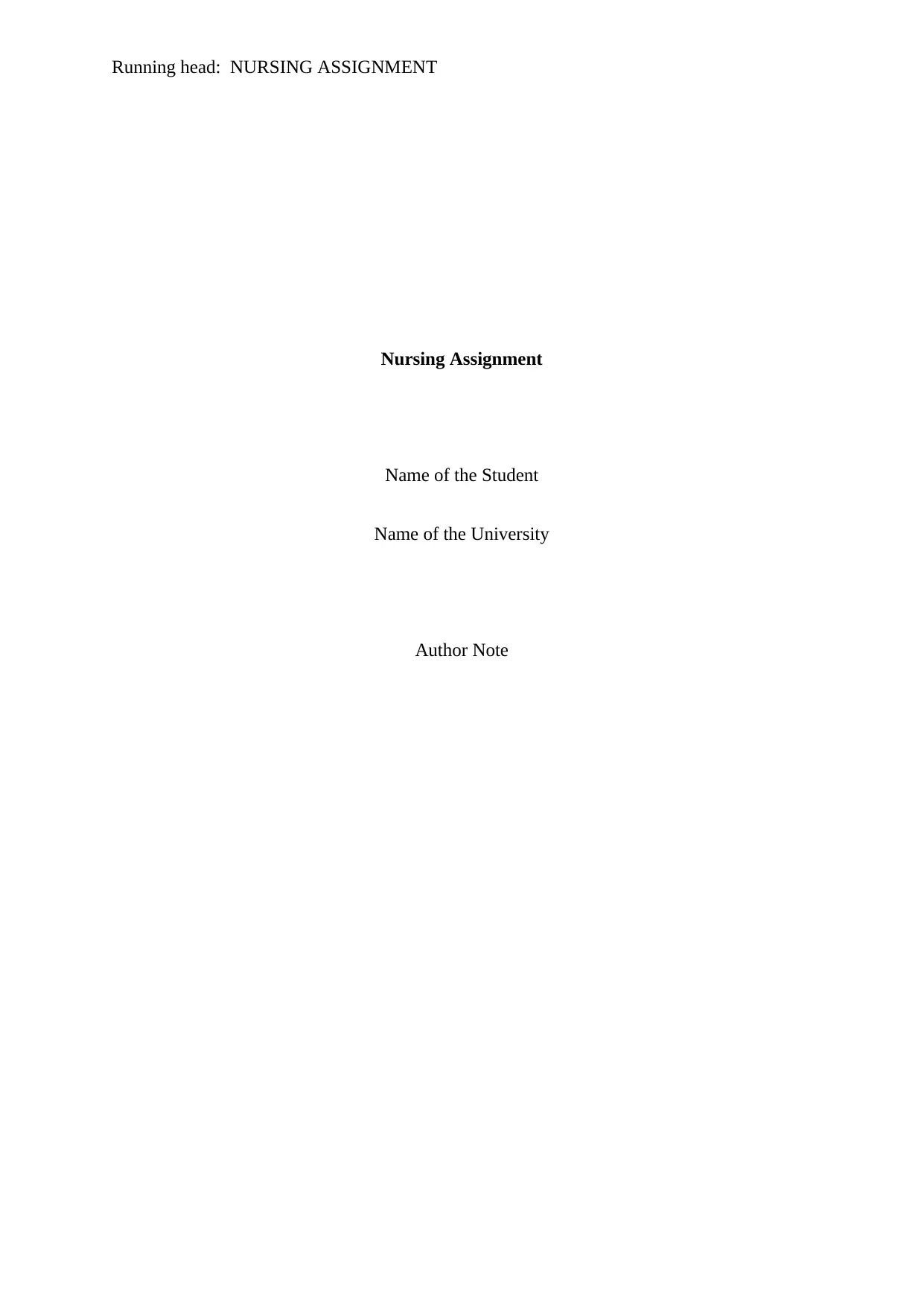
Running head: NURSING ASSIGNMENT
Nursing Assignment
Name of the Student
Name of the University
Author Note
Nursing Assignment
Name of the Student
Name of the University
Author Note
Secure Best Marks with AI Grader
Need help grading? Try our AI Grader for instant feedback on your assignments.
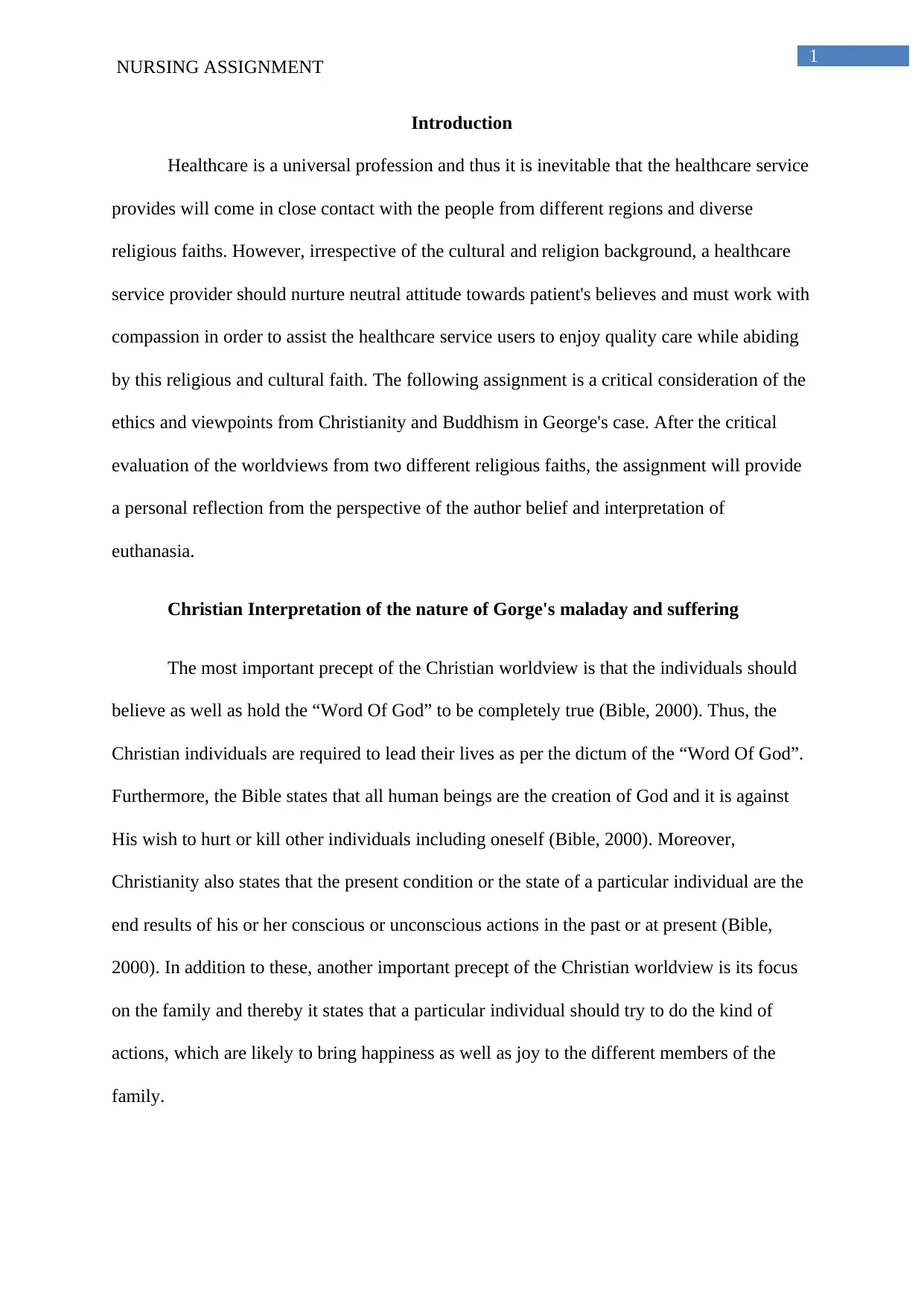
1
NURSING ASSIGNMENT
Introduction
Healthcare is a universal profession and thus it is inevitable that the healthcare service
provides will come in close contact with the people from different regions and diverse
religious faiths. However, irrespective of the cultural and religion background, a healthcare
service provider should nurture neutral attitude towards patient's believes and must work with
compassion in order to assist the healthcare service users to enjoy quality care while abiding
by this religious and cultural faith. The following assignment is a critical consideration of the
ethics and viewpoints from Christianity and Buddhism in George's case. After the critical
evaluation of the worldviews from two different religious faiths, the assignment will provide
a personal reflection from the perspective of the author belief and interpretation of
euthanasia.
Christian Interpretation of the nature of Gorge's maladay and suffering
The most important precept of the Christian worldview is that the individuals should
believe as well as hold the “Word Of God” to be completely true (Bible, 2000). Thus, the
Christian individuals are required to lead their lives as per the dictum of the “Word Of God”.
Furthermore, the Bible states that all human beings are the creation of God and it is against
His wish to hurt or kill other individuals including oneself (Bible, 2000). Moreover,
Christianity also states that the present condition or the state of a particular individual are the
end results of his or her conscious or unconscious actions in the past or at present (Bible,
2000). In addition to these, another important precept of the Christian worldview is its focus
on the family and thereby it states that a particular individual should try to do the kind of
actions, which are likely to bring happiness as well as joy to the different members of the
family.
NURSING ASSIGNMENT
Introduction
Healthcare is a universal profession and thus it is inevitable that the healthcare service
provides will come in close contact with the people from different regions and diverse
religious faiths. However, irrespective of the cultural and religion background, a healthcare
service provider should nurture neutral attitude towards patient's believes and must work with
compassion in order to assist the healthcare service users to enjoy quality care while abiding
by this religious and cultural faith. The following assignment is a critical consideration of the
ethics and viewpoints from Christianity and Buddhism in George's case. After the critical
evaluation of the worldviews from two different religious faiths, the assignment will provide
a personal reflection from the perspective of the author belief and interpretation of
euthanasia.
Christian Interpretation of the nature of Gorge's maladay and suffering
The most important precept of the Christian worldview is that the individuals should
believe as well as hold the “Word Of God” to be completely true (Bible, 2000). Thus, the
Christian individuals are required to lead their lives as per the dictum of the “Word Of God”.
Furthermore, the Bible states that all human beings are the creation of God and it is against
His wish to hurt or kill other individuals including oneself (Bible, 2000). Moreover,
Christianity also states that the present condition or the state of a particular individual are the
end results of his or her conscious or unconscious actions in the past or at present (Bible,
2000). In addition to these, another important precept of the Christian worldview is its focus
on the family and thereby it states that a particular individual should try to do the kind of
actions, which are likely to bring happiness as well as joy to the different members of the
family.
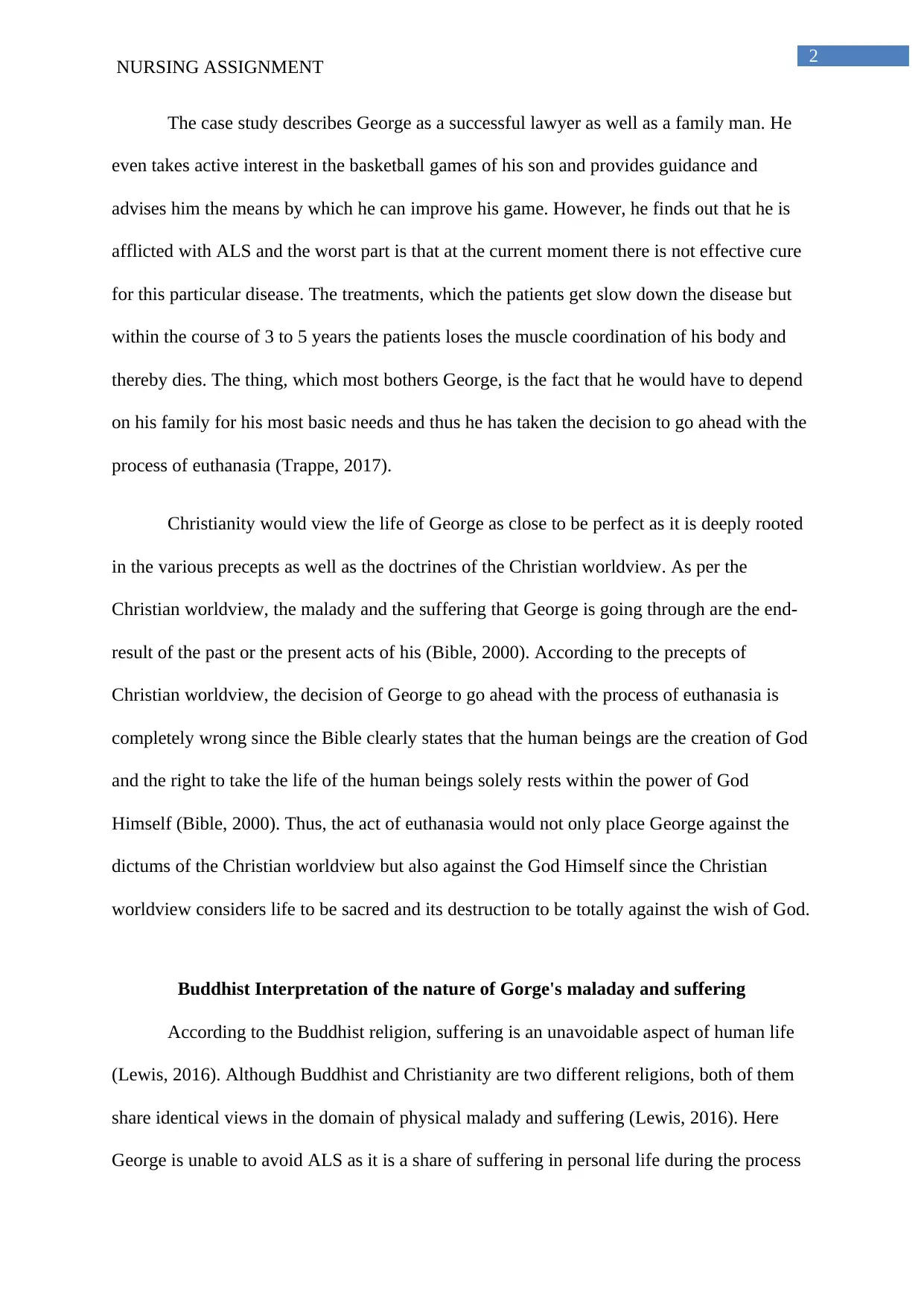
2
NURSING ASSIGNMENT
The case study describes George as a successful lawyer as well as a family man. He
even takes active interest in the basketball games of his son and provides guidance and
advises him the means by which he can improve his game. However, he finds out that he is
afflicted with ALS and the worst part is that at the current moment there is not effective cure
for this particular disease. The treatments, which the patients get slow down the disease but
within the course of 3 to 5 years the patients loses the muscle coordination of his body and
thereby dies. The thing, which most bothers George, is the fact that he would have to depend
on his family for his most basic needs and thus he has taken the decision to go ahead with the
process of euthanasia (Trappe, 2017).
Christianity would view the life of George as close to be perfect as it is deeply rooted
in the various precepts as well as the doctrines of the Christian worldview. As per the
Christian worldview, the malady and the suffering that George is going through are the end-
result of the past or the present acts of his (Bible, 2000). According to the precepts of
Christian worldview, the decision of George to go ahead with the process of euthanasia is
completely wrong since the Bible clearly states that the human beings are the creation of God
and the right to take the life of the human beings solely rests within the power of God
Himself (Bible, 2000). Thus, the act of euthanasia would not only place George against the
dictums of the Christian worldview but also against the God Himself since the Christian
worldview considers life to be sacred and its destruction to be totally against the wish of God.
Buddhist Interpretation of the nature of Gorge's maladay and suffering
According to the Buddhist religion, suffering is an unavoidable aspect of human life
(Lewis, 2016). Although Buddhist and Christianity are two different religions, both of them
share identical views in the domain of physical malady and suffering (Lewis, 2016). Here
George is unable to avoid ALS as it is a share of suffering in personal life during the process
NURSING ASSIGNMENT
The case study describes George as a successful lawyer as well as a family man. He
even takes active interest in the basketball games of his son and provides guidance and
advises him the means by which he can improve his game. However, he finds out that he is
afflicted with ALS and the worst part is that at the current moment there is not effective cure
for this particular disease. The treatments, which the patients get slow down the disease but
within the course of 3 to 5 years the patients loses the muscle coordination of his body and
thereby dies. The thing, which most bothers George, is the fact that he would have to depend
on his family for his most basic needs and thus he has taken the decision to go ahead with the
process of euthanasia (Trappe, 2017).
Christianity would view the life of George as close to be perfect as it is deeply rooted
in the various precepts as well as the doctrines of the Christian worldview. As per the
Christian worldview, the malady and the suffering that George is going through are the end-
result of the past or the present acts of his (Bible, 2000). According to the precepts of
Christian worldview, the decision of George to go ahead with the process of euthanasia is
completely wrong since the Bible clearly states that the human beings are the creation of God
and the right to take the life of the human beings solely rests within the power of God
Himself (Bible, 2000). Thus, the act of euthanasia would not only place George against the
dictums of the Christian worldview but also against the God Himself since the Christian
worldview considers life to be sacred and its destruction to be totally against the wish of God.
Buddhist Interpretation of the nature of Gorge's maladay and suffering
According to the Buddhist religion, suffering is an unavoidable aspect of human life
(Lewis, 2016). Although Buddhist and Christianity are two different religions, both of them
share identical views in the domain of physical malady and suffering (Lewis, 2016). Here
George is unable to avoid ALS as it is a share of suffering in personal life during the process
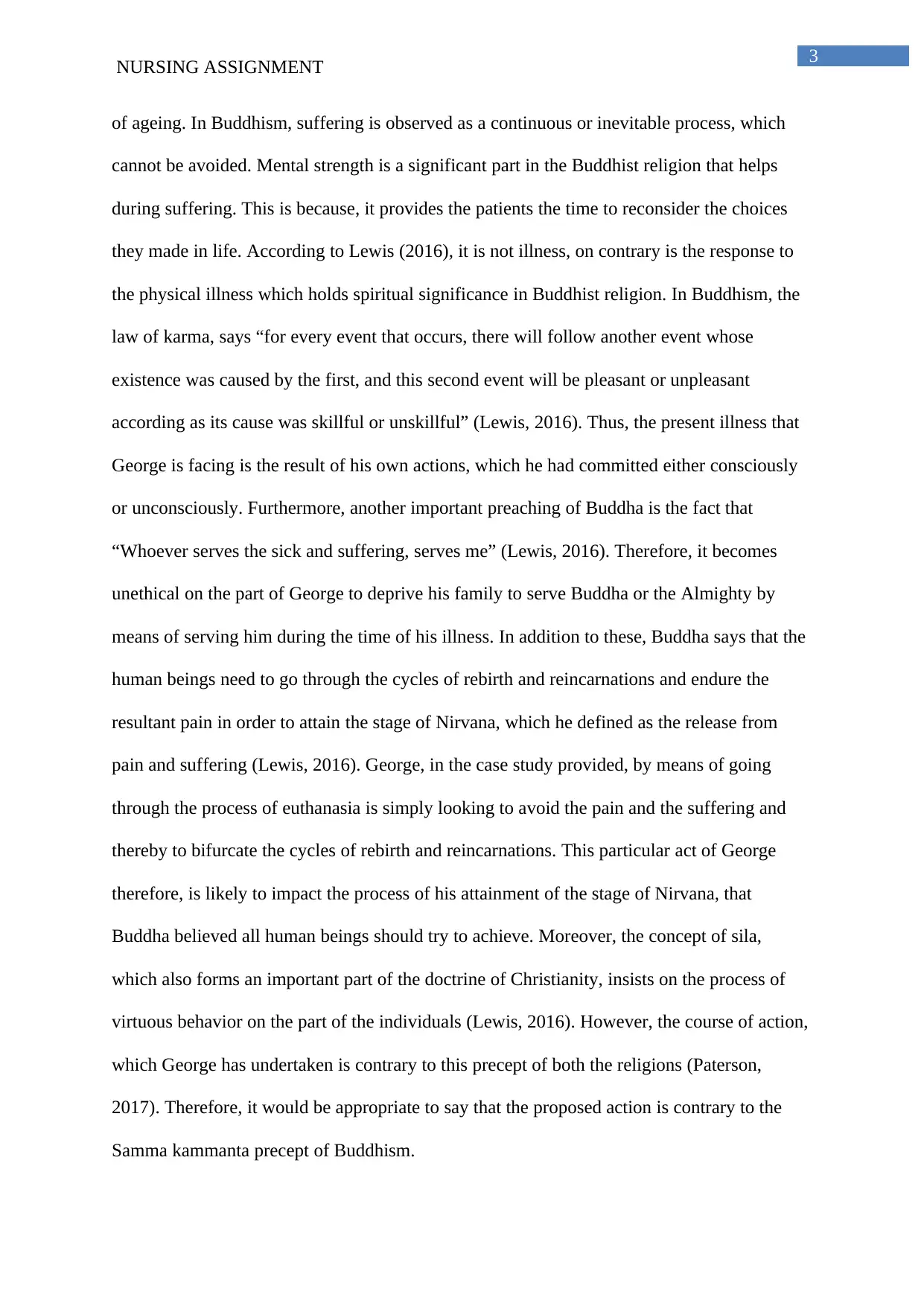
3
NURSING ASSIGNMENT
of ageing. In Buddhism, suffering is observed as a continuous or inevitable process, which
cannot be avoided. Mental strength is a significant part in the Buddhist religion that helps
during suffering. This is because, it provides the patients the time to reconsider the choices
they made in life. According to Lewis (2016), it is not illness, on contrary is the response to
the physical illness which holds spiritual significance in Buddhist religion. In Buddhism, the
law of karma, says “for every event that occurs, there will follow another event whose
existence was caused by the first, and this second event will be pleasant or unpleasant
according as its cause was skillful or unskillful” (Lewis, 2016). Thus, the present illness that
George is facing is the result of his own actions, which he had committed either consciously
or unconsciously. Furthermore, another important preaching of Buddha is the fact that
“Whoever serves the sick and suffering, serves me” (Lewis, 2016). Therefore, it becomes
unethical on the part of George to deprive his family to serve Buddha or the Almighty by
means of serving him during the time of his illness. In addition to these, Buddha says that the
human beings need to go through the cycles of rebirth and reincarnations and endure the
resultant pain in order to attain the stage of Nirvana, which he defined as the release from
pain and suffering (Lewis, 2016). George, in the case study provided, by means of going
through the process of euthanasia is simply looking to avoid the pain and the suffering and
thereby to bifurcate the cycles of rebirth and reincarnations. This particular act of George
therefore, is likely to impact the process of his attainment of the stage of Nirvana, that
Buddha believed all human beings should try to achieve. Moreover, the concept of sila,
which also forms an important part of the doctrine of Christianity, insists on the process of
virtuous behavior on the part of the individuals (Lewis, 2016). However, the course of action,
which George has undertaken is contrary to this precept of both the religions (Paterson,
2017). Therefore, it would be appropriate to say that the proposed action is contrary to the
Samma kammanta precept of Buddhism.
NURSING ASSIGNMENT
of ageing. In Buddhism, suffering is observed as a continuous or inevitable process, which
cannot be avoided. Mental strength is a significant part in the Buddhist religion that helps
during suffering. This is because, it provides the patients the time to reconsider the choices
they made in life. According to Lewis (2016), it is not illness, on contrary is the response to
the physical illness which holds spiritual significance in Buddhist religion. In Buddhism, the
law of karma, says “for every event that occurs, there will follow another event whose
existence was caused by the first, and this second event will be pleasant or unpleasant
according as its cause was skillful or unskillful” (Lewis, 2016). Thus, the present illness that
George is facing is the result of his own actions, which he had committed either consciously
or unconsciously. Furthermore, another important preaching of Buddha is the fact that
“Whoever serves the sick and suffering, serves me” (Lewis, 2016). Therefore, it becomes
unethical on the part of George to deprive his family to serve Buddha or the Almighty by
means of serving him during the time of his illness. In addition to these, Buddha says that the
human beings need to go through the cycles of rebirth and reincarnations and endure the
resultant pain in order to attain the stage of Nirvana, which he defined as the release from
pain and suffering (Lewis, 2016). George, in the case study provided, by means of going
through the process of euthanasia is simply looking to avoid the pain and the suffering and
thereby to bifurcate the cycles of rebirth and reincarnations. This particular act of George
therefore, is likely to impact the process of his attainment of the stage of Nirvana, that
Buddha believed all human beings should try to achieve. Moreover, the concept of sila,
which also forms an important part of the doctrine of Christianity, insists on the process of
virtuous behavior on the part of the individuals (Lewis, 2016). However, the course of action,
which George has undertaken is contrary to this precept of both the religions (Paterson,
2017). Therefore, it would be appropriate to say that the proposed action is contrary to the
Samma kammanta precept of Buddhism.
Secure Best Marks with AI Grader
Need help grading? Try our AI Grader for instant feedback on your assignments.
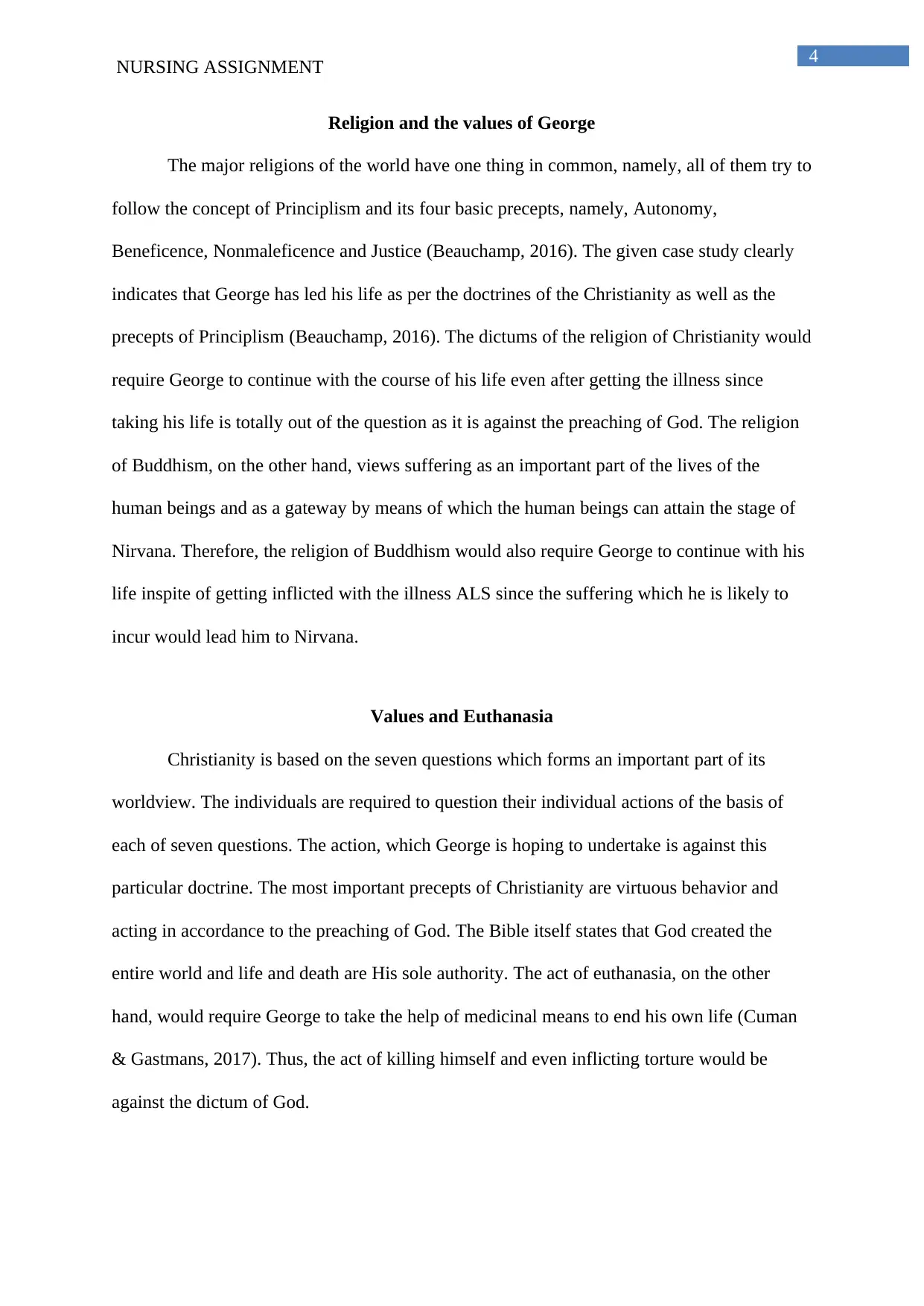
4
NURSING ASSIGNMENT
Religion and the values of George
The major religions of the world have one thing in common, namely, all of them try to
follow the concept of Principlism and its four basic precepts, namely, Autonomy,
Beneficence, Nonmaleficence and Justice (Beauchamp, 2016). The given case study clearly
indicates that George has led his life as per the doctrines of the Christianity as well as the
precepts of Principlism (Beauchamp, 2016). The dictums of the religion of Christianity would
require George to continue with the course of his life even after getting the illness since
taking his life is totally out of the question as it is against the preaching of God. The religion
of Buddhism, on the other hand, views suffering as an important part of the lives of the
human beings and as a gateway by means of which the human beings can attain the stage of
Nirvana. Therefore, the religion of Buddhism would also require George to continue with his
life inspite of getting inflicted with the illness ALS since the suffering which he is likely to
incur would lead him to Nirvana.
Values and Euthanasia
Christianity is based on the seven questions which forms an important part of its
worldview. The individuals are required to question their individual actions of the basis of
each of seven questions. The action, which George is hoping to undertake is against this
particular doctrine. The most important precepts of Christianity are virtuous behavior and
acting in accordance to the preaching of God. The Bible itself states that God created the
entire world and life and death are His sole authority. The act of euthanasia, on the other
hand, would require George to take the help of medicinal means to end his own life (Cuman
& Gastmans, 2017). Thus, the act of killing himself and even inflicting torture would be
against the dictum of God.
NURSING ASSIGNMENT
Religion and the values of George
The major religions of the world have one thing in common, namely, all of them try to
follow the concept of Principlism and its four basic precepts, namely, Autonomy,
Beneficence, Nonmaleficence and Justice (Beauchamp, 2016). The given case study clearly
indicates that George has led his life as per the doctrines of the Christianity as well as the
precepts of Principlism (Beauchamp, 2016). The dictums of the religion of Christianity would
require George to continue with the course of his life even after getting the illness since
taking his life is totally out of the question as it is against the preaching of God. The religion
of Buddhism, on the other hand, views suffering as an important part of the lives of the
human beings and as a gateway by means of which the human beings can attain the stage of
Nirvana. Therefore, the religion of Buddhism would also require George to continue with his
life inspite of getting inflicted with the illness ALS since the suffering which he is likely to
incur would lead him to Nirvana.
Values and Euthanasia
Christianity is based on the seven questions which forms an important part of its
worldview. The individuals are required to question their individual actions of the basis of
each of seven questions. The action, which George is hoping to undertake is against this
particular doctrine. The most important precepts of Christianity are virtuous behavior and
acting in accordance to the preaching of God. The Bible itself states that God created the
entire world and life and death are His sole authority. The act of euthanasia, on the other
hand, would require George to take the help of medicinal means to end his own life (Cuman
& Gastmans, 2017). Thus, the act of killing himself and even inflicting torture would be
against the dictum of God.
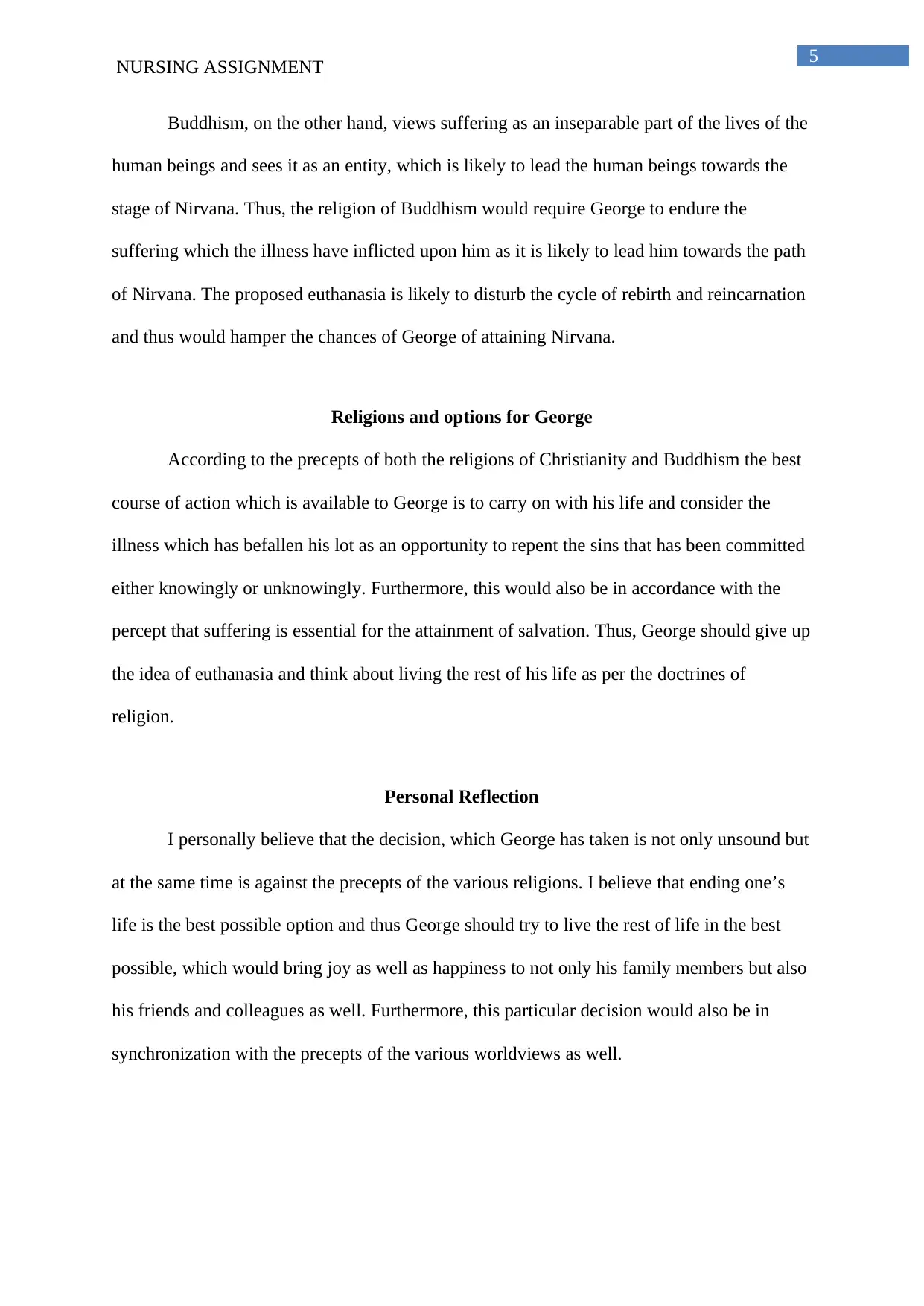
5
NURSING ASSIGNMENT
Buddhism, on the other hand, views suffering as an inseparable part of the lives of the
human beings and sees it as an entity, which is likely to lead the human beings towards the
stage of Nirvana. Thus, the religion of Buddhism would require George to endure the
suffering which the illness have inflicted upon him as it is likely to lead him towards the path
of Nirvana. The proposed euthanasia is likely to disturb the cycle of rebirth and reincarnation
and thus would hamper the chances of George of attaining Nirvana.
Religions and options for George
According to the precepts of both the religions of Christianity and Buddhism the best
course of action which is available to George is to carry on with his life and consider the
illness which has befallen his lot as an opportunity to repent the sins that has been committed
either knowingly or unknowingly. Furthermore, this would also be in accordance with the
percept that suffering is essential for the attainment of salvation. Thus, George should give up
the idea of euthanasia and think about living the rest of his life as per the doctrines of
religion.
Personal Reflection
I personally believe that the decision, which George has taken is not only unsound but
at the same time is against the precepts of the various religions. I believe that ending one’s
life is the best possible option and thus George should try to live the rest of life in the best
possible, which would bring joy as well as happiness to not only his family members but also
his friends and colleagues as well. Furthermore, this particular decision would also be in
synchronization with the precepts of the various worldviews as well.
NURSING ASSIGNMENT
Buddhism, on the other hand, views suffering as an inseparable part of the lives of the
human beings and sees it as an entity, which is likely to lead the human beings towards the
stage of Nirvana. Thus, the religion of Buddhism would require George to endure the
suffering which the illness have inflicted upon him as it is likely to lead him towards the path
of Nirvana. The proposed euthanasia is likely to disturb the cycle of rebirth and reincarnation
and thus would hamper the chances of George of attaining Nirvana.
Religions and options for George
According to the precepts of both the religions of Christianity and Buddhism the best
course of action which is available to George is to carry on with his life and consider the
illness which has befallen his lot as an opportunity to repent the sins that has been committed
either knowingly or unknowingly. Furthermore, this would also be in accordance with the
percept that suffering is essential for the attainment of salvation. Thus, George should give up
the idea of euthanasia and think about living the rest of his life as per the doctrines of
religion.
Personal Reflection
I personally believe that the decision, which George has taken is not only unsound but
at the same time is against the precepts of the various religions. I believe that ending one’s
life is the best possible option and thus George should try to live the rest of life in the best
possible, which would bring joy as well as happiness to not only his family members but also
his friends and colleagues as well. Furthermore, this particular decision would also be in
synchronization with the precepts of the various worldviews as well.
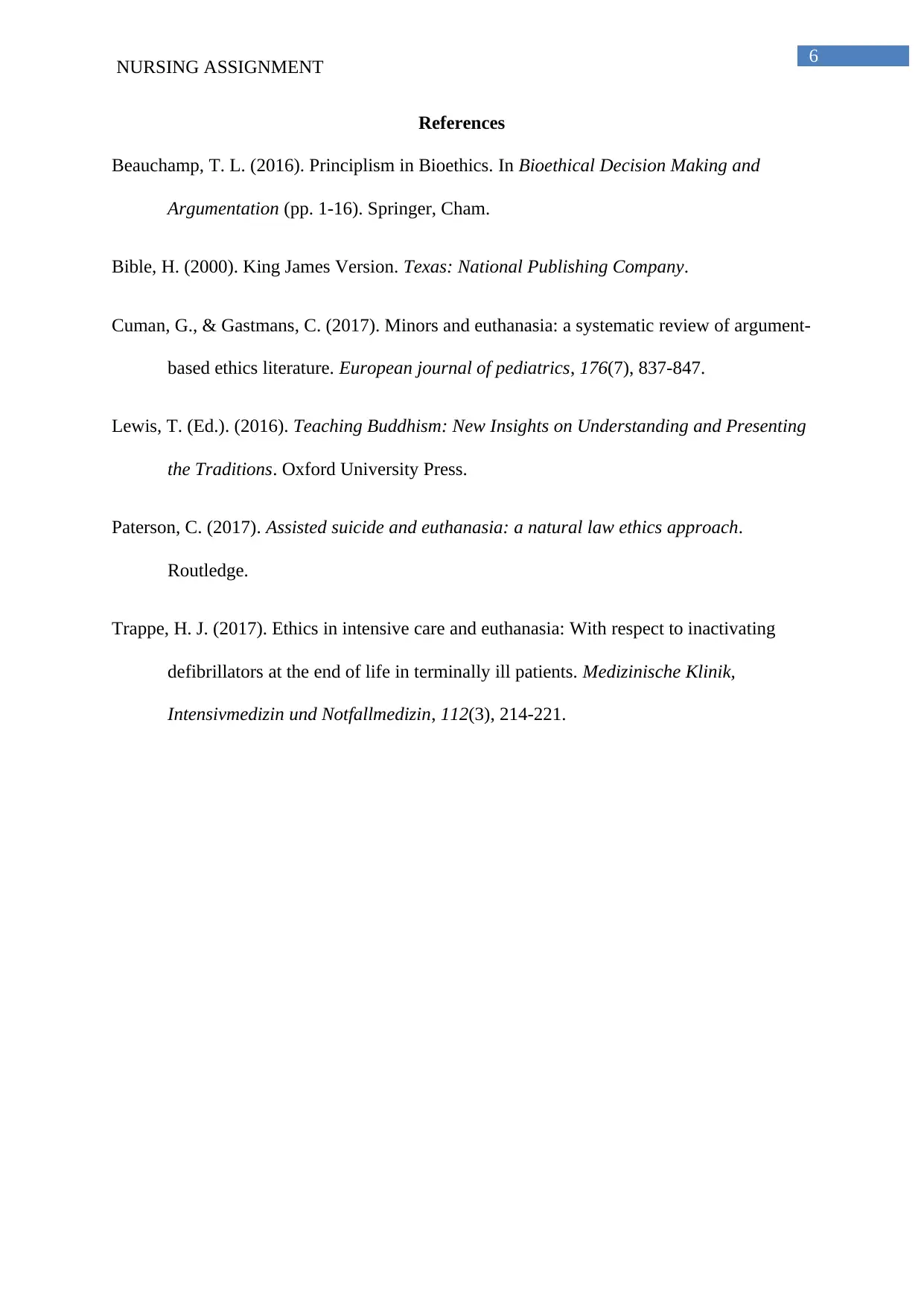
6
NURSING ASSIGNMENT
References
Beauchamp, T. L. (2016). Principlism in Bioethics. In Bioethical Decision Making and
Argumentation (pp. 1-16). Springer, Cham.
Bible, H. (2000). King James Version. Texas: National Publishing Company.
Cuman, G., & Gastmans, C. (2017). Minors and euthanasia: a systematic review of argument-
based ethics literature. European journal of pediatrics, 176(7), 837-847.
Lewis, T. (Ed.). (2016). Teaching Buddhism: New Insights on Understanding and Presenting
the Traditions. Oxford University Press.
Paterson, C. (2017). Assisted suicide and euthanasia: a natural law ethics approach.
Routledge.
Trappe, H. J. (2017). Ethics in intensive care and euthanasia: With respect to inactivating
defibrillators at the end of life in terminally ill patients. Medizinische Klinik,
Intensivmedizin und Notfallmedizin, 112(3), 214-221.
NURSING ASSIGNMENT
References
Beauchamp, T. L. (2016). Principlism in Bioethics. In Bioethical Decision Making and
Argumentation (pp. 1-16). Springer, Cham.
Bible, H. (2000). King James Version. Texas: National Publishing Company.
Cuman, G., & Gastmans, C. (2017). Minors and euthanasia: a systematic review of argument-
based ethics literature. European journal of pediatrics, 176(7), 837-847.
Lewis, T. (Ed.). (2016). Teaching Buddhism: New Insights on Understanding and Presenting
the Traditions. Oxford University Press.
Paterson, C. (2017). Assisted suicide and euthanasia: a natural law ethics approach.
Routledge.
Trappe, H. J. (2017). Ethics in intensive care and euthanasia: With respect to inactivating
defibrillators at the end of life in terminally ill patients. Medizinische Klinik,
Intensivmedizin und Notfallmedizin, 112(3), 214-221.
1 out of 7
Related Documents
Your All-in-One AI-Powered Toolkit for Academic Success.
+13062052269
info@desklib.com
Available 24*7 on WhatsApp / Email
![[object Object]](/_next/static/media/star-bottom.7253800d.svg)
Unlock your academic potential
© 2024 | Zucol Services PVT LTD | All rights reserved.





